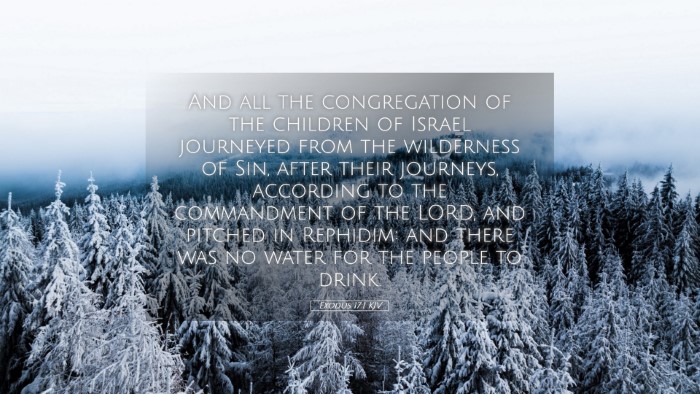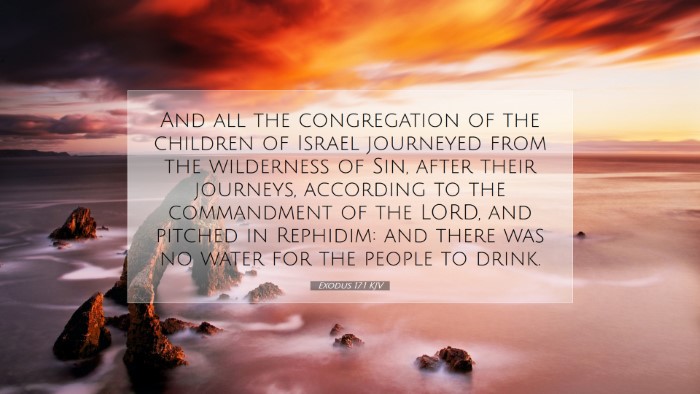Exodus 17:1 Commentary
Bible Verse: "And all the congregation of the children of Israel journeyed from the wilderness of Sin, after their journeys, according to the commandment of the Lord, and pitched in Rephidim: and there was no water for the people to drink."
Introduction
This verse introduces a pivotal moment in the journey of the Israelites in the wilderness. It highlights the struggles faced by the people of Israel and sets the stage for God's miraculous provision. Commentaries from respected theologians provide us with a deeper understanding of the spiritual and practical implications of this passage.
Contextual Background
According to Matthew Henry, this passage occurs during the Israelites' exodus from Egypt, a journey marked by divine guidance and testing. The wilderness of Sin and the encampment at Rephidim are significant locations that reveal God’s providence and the people’s need for reliance on Him. The wilderness symbolizes a place of trial and testing, where faith is cultivated.
Insights from Public Domain Commentaries
Matthew Henry's Commentary
Matthew Henry emphasizes that the journey of the Israelites was directed by the commandment of the Lord, suggesting that obedience to God's will is paramount. He observes that despite their recent miracles, the people now confronted a severe lack of water, which would test their faith and patience. Henry notes:
- This dryness in Rephidim serves as a metaphor for spiritual barrenness that can occur even in the midst of divine favor.
- He highlights the importance of community in this narrative, as the challenges faced are collective, reflecting the corporate nature of faith.
Albert Barnes' Commentary
Albert Barnes provides a historical analysis of the location Rephidim, which implies "resting places." He points out that the Israelites reached a point that should have been a place of rest, only to find themselves in desperate need. Barnes elaborates on the psychological and spiritual ramifications:
- This situation reveals the contradictions often found in the life of faith, where the expectation of comfort is met with trials.
- Barnes encourages readers to reflect on their own lives during times of want, underscoring that God often leads us into challenging places to deepen our reliance on Him.
Adam Clarke's Commentary
Adam Clarke discusses the significance of water as a symbol of life and sustenance in biblical literature. He interprets the absence of water in Rephidim as an allegory for a lack of spiritual nourishment. According to Clarke:
- The trial faced by the Israelites is not merely physical; it represents a spiritual desolation that confronts every believer.
- He further expounds that this moment sets the stage for divine intervention, emphasizing the importance of approaching God in our trials.
Application for Today
The events surrounding Exodus 17:1 speak volumes to contemporary believers, especially pastors and theologians who seek to draw lessons from biblical history. This passage demonstrates several key themes:
- Community and Faith: The challenges faced by the congregation highlight that faith is often a communal journey. Pastors can draw from this to build unity within their congregations.
- Trust in Divine Providence: Just as God provided for the Israelites, He remains our source of nourishment and support in times of need. The lack of water serves as a reminder to trust in God’s provision even when circumstances seem dire.
- Spiritual Growth through Trials: The wilderness experiences are essential for spiritual development. Believers are encouraged to view their personal struggles as opportunities for growth, fostering resilience and dependence on God.
Conclusion
Exodus 17:1 is more than a historical account; it is a profound spiritual lesson. As the Israelites journey through the wilderness, they experience both the hardships of physical need and the necessity of spiritual dependency. Insights from the commentaries of Matthew Henry, Albert Barnes, and Adam Clarke collectively remind us of the importance of obedience, community, trust, and perseverance in our faith journey.


